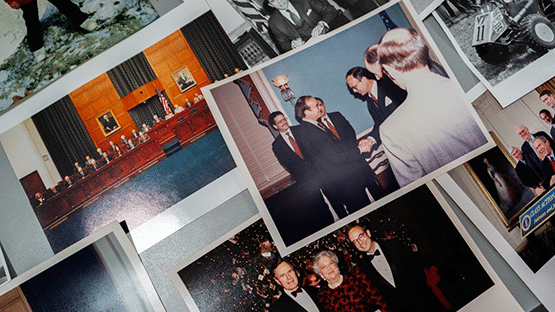
An extensive collection of records documenting former Congressman Rick Boucher’s political career now have a new home at Virginia Tech.
The collection of 76 boxes including 6,111 folders and 72 awards spanning his nearly four decades of service are now residing in the University Libraries’ Special Collections and University archives.
Bocher, a Democrat from Southwest Virginia, was a member of the Virginia Senate for seven years and a U.S. representative for Virginia’s 9th Congressional District from 1982 to 2011.
Special Collections and University Archives project archivist Bess Pittman arranged and described items in the collection.
“The collection reflects Rick Boucher’s professional work, including correspondence, numerous handwritten presentations he delivered in committees and on the House floor, hundreds of photos, awards, memos from his office, newsletters, brochures, pamphlets, campaign materials – basically everything that came in during his work as a congressman and state legislator,” said Pittman.
Boucher worked with many universities and colleges but when it came time to gift his materials, he chose Virginia Tech.
“I had a long association with Virginia Tech, working actively with four Virginia Tech presidents. It was the largest institution of higher learning in my district and its largest employer, and I wanted my papers to go there given how respected the institution is,” Boucher said. “The university’s acclaimed technical expertise appealed to me because a lot of this collection now has the capability of being made digitally accessible by anyone who has internet access.”
A small digital exhibit is online now with a sampling of more than 200 items from the collection. Archivists are working to add more content to the collection.
Pittman was responsible for organizing all of the materials into one cohesive collection, a process that took nearly a year.
“It offers some really amazing insights into the work that goes into governing a region. The primary focus is the 9th District, but you can see the ripples into the broader work that Boucher was involved in,” she said.
A lot of hard work goes into archiving a collection of this size, but for Pittman, it’s all worth it.
“An archive exists as a way to transmit the voices of the past through history and into the future. Without repositories like this, we lose so much of our cultural context. We lose so many of those voices. By preserving them, we allow people to gain the wisdom of the past, and we can do research about the people and places that made us who we are.”










